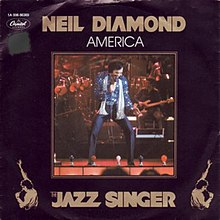America (Neil Diamond song)
| "America" | ||||
|---|---|---|---|---|
 | ||||
| Single by Neil Diamond | ||||
| from the album The Jazz Singer soundtrack | ||||
| B-side | "Songs of Life" | |||
| Released | April 1981 | |||
| Recorded | 1980 | |||
| Genre | Pop | |||
| Length | 3:27 (single version) 4:19 (album version) | |||
| Label | Capitol | |||
| Songwriter(s) | Neil Diamond | |||
| Producer(s) | Bob Gaudio | |||
| Neil Diamond singles chronology | ||||
| ||||
"America" is a song written and originally recorded by Neil Diamond, released in 1980 on the soundtrack album of Diamond's film The Jazz Singer. The song was a hit single in the United States in 1981, reaching number eight on the Billboard Hot 100, and was Diamond's sixth number one on the Adult Contemporary chart.[1] Billboard also rated it the #62 pop single overall for 1981.[2] Although the single version was a studio recording, overdubs of crowd cheering simulate the feel of a live performance.
As of June 2017[update], the song had sold 634,440 downloads in the United States since Nielsen started tracking sales.[3]
Background
[edit]The song's theme is a positive interpretation of the history of immigration to the United States, during both the early 1900s and the present. Combining Diamond's powerful melody, dynamic arrangement, and bombastic vocal, it ends with an interpolation of the traditional patriotic song "My Country, 'Tis of Thee".
In Diamond's concerts, the song is a very popular number both at home and abroad, with a large United States flag often displayed from the rafters on cue to the lyric "Every time that flag's unfurled / They're coming to America."[citation needed] The song was featured at the Stone Mountain Laser Show near Atlanta, Georgia.[4]
The song has been used in a number of contexts, including as a theme song for Michael Dukakis' 1988 presidential campaign and in promotion of the 1996 Olympics. Diamond also sang it at the centennial re-dedication of the Statue of Liberty[5] and at Ball Arena in Denver on New Year's Eve 1999.[6]
Shortly after the September 11, 2001, attacks, Diamond modified the lyrics to "America" slightly during live performances. Instead of "They're comin' to America," toward the end it became "Stand up for America."[7][8] It was included on a memorandum listing songs deemed inappropriate by Clear Channel Communications following the September 11 attacks.[9]
Reception
[edit]Record World said that "Rumbling drums and Diamond's dramatic, upbeat vocal will incite waves of patriotic surges."[10]
Chart history
[edit]
Weekly charts[edit]
|
Year-end charts[edit]
|
Certifications
[edit]| Region | Certification | Certified units/sales |
|---|---|---|
| United Kingdom (BPI)[18] | Silver | 200,000‡ |
|
‡ Sales+streaming figures based on certification alone. | ||
Cover version
[edit]New-age pianist David Lanz performed a cover of this song for his album Finding Paradise.[19]
See also
[edit]References
[edit]- ^ Whitburn, Joel (2002). Top Adult Contemporary: 1961-2001. Record Research. p. 78.
- ^ "Pop Singles". Billboard Magazine. December 26, 1980. p. YE-9. Retrieved August 16, 2012.
- ^ "Nielsen SoundScan charts – Digital Songs – Week Ending: 7/6/2017" (PDF). Nielsen SoundScan. Archived from the original (PDF) on August 8, 2017. Retrieved June 17, 2021.
- ^ Thrasher, Paula Crouch (May 25, 1991). "Waves 'N' Raves". pp. L/20–L/22. Retrieved March 26, 2017.
Then, until the end of July, the lineup is Charlie Daniels' "The Devil Went Down to Georgia," Bob James "Courtship" and Neil Diamond's "Coming to America." Rounding out the summer: A Beatles medley, Alan Parsons' "Pipeline" and Ray Lynch's "Celestial Soda Pop."
- ^ Laura Jackson. Neil Diamond: His Life, His Music, His Passion (ECW Press, 2005): p. 165.
- ^ "Neil Diamond Denver NYE 1999/2000". December 31, 2015. Archived from the original on December 19, 2021. Retrieved May 17, 2021 – via YouTube.
- ^ Isaac Guzman, "American Icon: Neil Diamond shows his colors at Garden concert Archived 2012-07-16 at the Wayback Machine." Daily News Feature Writer.
- ^ Scott Holleran. "Neil Diamond Diamond Shines in Red, White and Blue Archived 2012-03-30 at the Wayback Machine" (2001). Los Angeles Daily News.
- ^ Strauss, Neil (November 19, 2001). "The Pop Life; After the Horror, Radio Stations Pull Some Songs". The New York Times. Retrieved August 4, 2008.
- ^ "Hits of the Week" (PDF). Record World. April 25, 1981. p. 1. Retrieved February 26, 2023.
- ^ "Item Display - RPM - Library and Archives Canada". Collectionscanada.gc.ca. June 13, 1981. Retrieved April 7, 2018.
- ^ "Item Display - RPM - Library and Archives Canada". Collectionscanada.gc.ca. June 27, 1981. Retrieved April 8, 2018.
- ^ Joel Whitburn's Top Pop Singles 1955-1990 - ISBN 0-89820-089-X
- ^ Whitburn, Joel (2002). Top Adult Contemporary: 1961-2001. Record Research. p. 78.
- ^ "Cash Box Top 100 Singles, June 27, 1981". Archived from the original on June 3, 2015. Retrieved April 7, 2018.
- ^ Musicoutfitters.com
- ^ "Cash Box Year-End Charts: Top 100 Pop Singles, December 26, 1981". Archived from the original on October 22, 2016. Retrieved April 7, 2018.
- ^ "British single certifications – Neil Diamond – America". British Phonographic Industry. Retrieved June 14, 2024.
- ^ "Finding Paradise overview". Allmusic.com.
